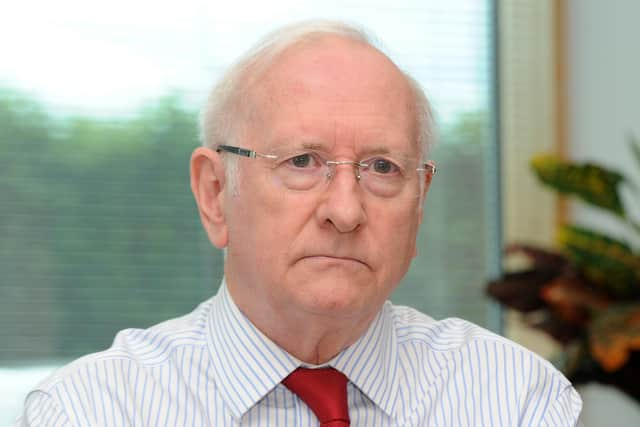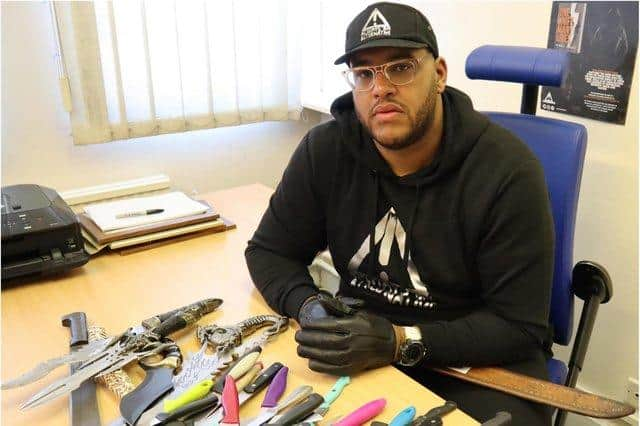More than two in five serious offenders in South Yorkshire are ‘career criminals’ with at least 15 previous offences
and live on Freeview channel 276
In South Yorkshire last year, in 1,565 of the 3,747 cases (42 per cent) where an adult admitted or was found guilty of an indictable offence – such as theft, violence or rape – the offender had at least 15 previous convictions or cautions, Ministry of Justice data shows.
That included 52 where the offender had 75 or more previous convictions or cautions.
POLICE: Killamarsh deaths: Everything we know as Damien Bendall is remanded in custody on murder charges


Advertisement
Hide AdAdvertisement
Hide AdThe figures also showed that of the cases where offenders had at least 15 previous convictions or cautions, just 729 (47 per cent) resulted in an immediate prison sentence.
Some 153 (10 per cent) resulted in no punishment and 149 (10 per cent) with a fine.
The outcomes for 112 cases were not specified.


Anthony Olaseinde, founder of Sheffield-based anti-knife crime charity Always An Alternative, said that not enough was available in terms of rehabilitation for people with criminal records who may struggle to adapt to life without resorting to crime.
“People are reoffending because there is not enough money being put into preventing crime, and intervening with people who commit crime,” he said.
Advertisement
Hide AdAdvertisement
Hide Ad“People need to look further into the future and, rather than just locking people up, thinking about how to stop them committing a crime again.
“You should always try and put the work in with people before they commit a crime, or intervene once they have committed one to make sure they don’t reoffend. It’s not about just enforcing the law.


“Somebody may get punished for beating somebody up, but then no work is done with them to make sure they don’t do it again, and further down the line they may end up killing somebody. So by intervening, you are potentially saving a life.”
He added: “First and foremost, a person must want to change, but they need to be given the opportunity, too. If they can’t see an opportunity to change, they will go back to what they know best, which is crime.
Advertisement
Hide AdAdvertisement
Hide Ad“Especially those who are coming out of prison. They are expected just to adapt, but life in prison is very different to life outside.


“In prison you don’t have to worry about food and bills. It is hard to get a job anyway, but with a criminal record it is almost impossible. When you leave prison and you are expected to sort all of that out.
“People find it hard to adapt, and money needs to be invested in giving them this basic help. Otherwise offenders might resort to crime to try and solve those problems, or even intentionally commit a crime to get sent back to prison as they find that easier.”
The Labour Party said the “shocking” figures were partly a result of the Government's decision to part-privatise the probation service seven years ago – a move reversed in June this year with renationalisation of the service.
Advertisement
Hide AdAdvertisement
Hide AdLouise Haigh, MP for Sheffield Heeley, echoed Mr Olaseinde’s concerns about the lack of money available to help people turn their lives around and leave crime behind.
She said: “This data is very worrying and reveals an appalling level of reoffending across South Yorkshire and is a clear reflection of the state of our criminal justice system.
“Eleven years of austerity have seen courts closed, police officers, prison and probation officers cut and conviction rates plummet as a result. We’ve also seen services designed to reduce reoffending closed, so it’s little wonder that these figures are so high.


“We need to see a concerted effort from this Government to tackle crime in our communities after more than a decade where they have allowed it to soar.”
Advertisement
Hide AdAdvertisement
Hide AdDr Alan Billings, South Yorkshire Police and Crime Commissioner and chairman of the South Yorkshire Violence Reduction Executive Board said: “If we are to make a real difference to crime, including reoffending, we have to work harder at prevention and not just enforcement.
“The South Yorkshire Violence Reduction Unit was established in August 2019 and takes a long-term approach to preventing violence.
“The unit funds initiatives that focus on reducing re-offending by engaging with people who have been brought in to custody for violence related offences and in to the A&E unit with violence related injuries.
“The Plan B Custody Navigators and A&E Hospital Navigator schemes offer help to support people who are involved in violent crime to turn their lives around.
Advertisement
Hide AdAdvertisement
Hide Ad"The scheme offers help with housing, addiction, finances, counselling, education and employment. The navigators work with an individual for as long as they are needed and helps them find the confidence and skills to make positive choices and find a life away from crime and re-offending.”
In its plan for 2021-22 the Ministry of Justice said it would stop reoffending by focusing on interventions such as providing a home, job and access to treatment of substance-misuse.
It said the reunification of the probation service meant staff had the skills to run rehabilitative programmes, preventing crime and increasing supervision of offenders outside prison.
But groups which support the rehabilitation of reoffenders say the Government was still not doing enough.
Advertisement
Hide AdAdvertisement
Hide AdCharity Unlocked, which helps people dealing with the stigma of a criminal record, said people also needed support with physical and mental health and wellbeing, as well as housing and employment.
Chief executive Angela Cairns added: “Having to disclose a criminal record is a barrier to access those things – local authorities are permitted to exclude people with unspent convictions from social housing and more than half of employers admit they would discriminate against someone with a criminal record.”
A Ministry of Justice spokesperson said: “Reducing reoffending is one of our top priorities.
“That’s why we’re investing millions through the Beating Crime Plan to provide robust monitoring, while tackling the drivers of offending such as substance misuse, homelessness and unemployment.”